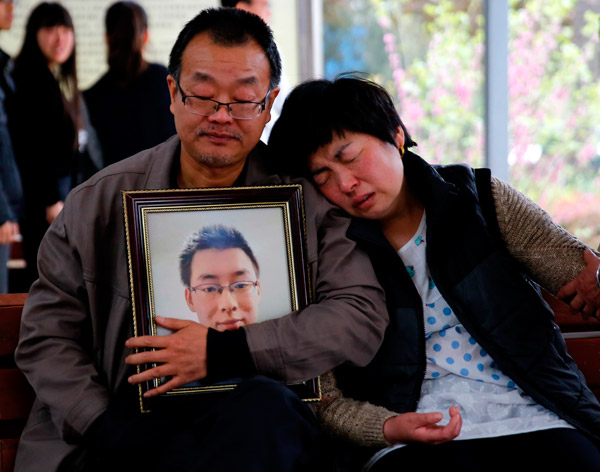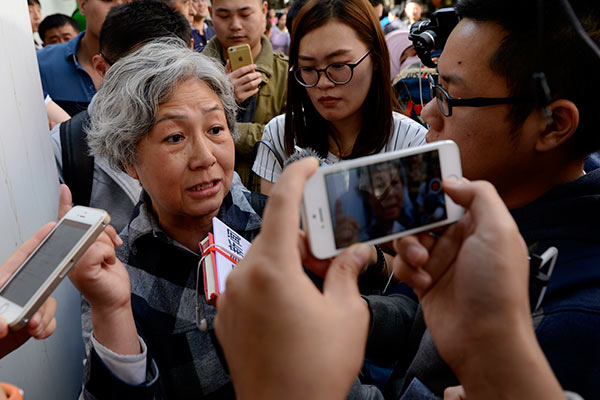Families demand refunds for cancer treatment
Families of patients who are receiving or have received immunotherapy cancer treatment at a military hospital in Beijing are demanding an explanation and refunds, after media exposed details of a case involving the hospital and a young patient who died recently.
Three top government and military health authorities have jointly launched an investigation into the Second Hospital of the Beijing Armed Police Corps, the National Health and Family Planning Commissions aid on Tuesday.
It said it would conduct the probe jointly with the health bureaus of the Central Military Commission and the national Armed Police Force.
The commission said on Monday that it and other ministries have set up a team to probe search engine giant Baidu to see whether misleading information regarding cancer treatment had led college student Wei Zexi,21, to choose the hospital for treatment.
Wei, a computer science major at Xidian University in Xi'an, Shaanxi province, died on April 12.He was diagnosed in 2014 with synovial sarcoma, a rare, terminal cancer of the soft tissue, and underwent surgeries and chemotherapy in other hospitals before turning to immunotherapy at the Second Hospital of the Beijing Armed Police Corps last year. He turned to the hospital after searching on Baidu.
Two months before his death, Wei said in an online post that a doctor at the hospital told his father that the immunotherapy was developed in the United States and was very effective. However, tumors entered his lungs several months after he received the treatment at a cost of more than 200,000 yuan ($30,900), he wrote.
The hospital declined to comment on Tuesday.
The hospital and Baidu became the target of public criticism in the past few days after media reports raised questions about Wei's treatment and the search engine's paid listing practice. The reports also brought to light the hospital's contracting of treatment to a private company.
The National Health and Family Planning Commission prohibits public hospitals from contracting their departments to others.
However, military hospitals such as the Second Hospital of the Beijing Armed Police Corps are administered by military authorities.
Although military hospitals are likewise banned from contracting departments to other companies, according to regulations issued by military authorities, in practice many military hospitals contract some of their departments to others for profit, media reports said.
 |
| The parents of Wei Zexi, a computer science major at Xidian University in Shaanxi province who died of a rare form of cancer, wait outside a funeral home in Xianyang, Shaanxi, on April 13.[Wan Jia/For China Daily] |
A man who revealed that one of his relatives was receiving the therapy at the facility, said on Tuesday,"The hospital promised us that the treatment is effective and we have spent a lot of money. After the media reports, we are very worried and demand an explanation from the hospital."
The man, who is from Beijing and requested that his name not be used, said he talked with a vice-president of the hospital on Tuesday, and learned that the hospital is investigating the case and will give the families an explanation and a response on Friday about whether it will provide are fund.
The man said about 20 people related to current or former immunotherapy patients at the hospital are joining a group seeking a response, a refund and compensation from the hospital for expenses they incurred during treatment, such as hotel costs.
He said they are waiting for the hospital's answer about whether the immunotherapy is illegal and whether the department offering the service had been contracted.
Meanwhile, in an internal statement issued by Baiduon Tuesday, the company said it would improve its background check and evaluation system to screen out any improper information.
"Baidu stands together with the people and won't compromise its integrity for economic profit,"it said.
A 63-year-old woman, who only gave her surname of Lu, said she is also demanding a refund of about 30,000 yuan for the therapy that her late husband, who suffered from liver cancer, had received at the hospital in December 2014.
"I read from a newspaper that the immunotherapy in the hospital is very advanced,"she said."We trusted in military hospitals and did not have doubt."
Lu said her husband's condition worsened after the therapy, which lasted for less than a day.
Her husband was transferred to a private hospital for treatment, but he died in March last year, she said.
A man surnamed Zhao from the Inner Mongolia autonomous region said his wife, about 50 years old, had received the immunotherapy treatment in question at the hospital in the past few days for nasopharyngeal cancer and stopped the treatment after the media reports.
He added that they are awaiting the hospital's response on a refund.
Zhao said his wife had therapy in June last year, and the result was satisfactory, but the same therapy this year did not produce results.
Although the two therapies were the same, the price for the therapy last year was about 67,000 yuan, while the second round of therapy cost 37,000 yuan, he said.
The couple has spent nearly 150,000 yuan for the treatment, taking into account other expenses such as trip costs and renting hotel rooms, he said.
"We are very worried,"he said."As farmers, we borrowed almost all the money from others for the treatment, and we never expected it might be useless."




